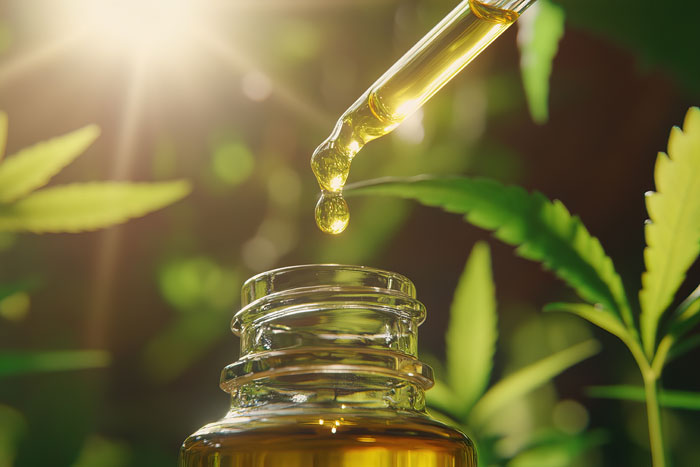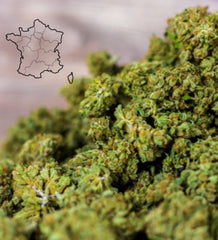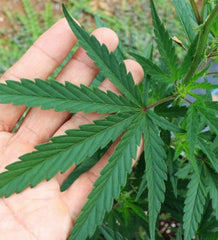
Understanding the Difference Between Full Spectrum and Broad Spectrum CBD: Which One is Right for You?
The benefits of CBD in brief
To understand the difference between full-spectrum and broad-spectrum CBD oils, it's essential to understand cannabidiol (CBD) itself. CBD is one of many naturally occurring compounds in hemp.
Unlike tetrahydrocannabinol (THC), CBD does not cause psychotropic effects. Instead, it is associated with a wide range of potential health and wellness effects. CBD has become extremely popular due to its many benefits:
- Reduced stress and anxiety: CBD can help calm the nervous system, reducing feelings of anxiety and tension.
- Improved Sleep: By promoting relaxation and regulating sleep cycles, CBD may contribute to better quality sleep.
- Anti-inflammatory effects: CBD has anti-inflammatory properties that may be helpful in reducing pain and inflammation.
- Pain Relief: By interacting with pain receptors, CBD can help reduce discomfort and chronic or occasional pain.
- Antioxidant Properties: CBD can help neutralize free radicals and protect cells from oxidative damage.
- Mood Regulation: CBD may positively influence neurotransmitters related to mood regulation, offering potential for improved emotional well-being.
- Immune System Support: Some studies suggest that CBD may strengthen the immune system by helping regulate inflammatory responses.
- Neurological Protection: Preliminary research indicates that CBD may be beneficial for neurological disorders such as epilepsy and multiple sclerosis.
Full spectrum CBD oil
Full-spectrum CBD oil is the result of a careful extraction process from the hemp plant. This type of oil is characterized by its richness in cannabinoids, terpenes, flavonoids, and other compounds naturally present in hemp. This combination creates what is known as the entourage effect, where the different elements interact to enhance their respective benefits.
Cannabinoids in action
Each cannabinoid in full-spectrum CBD oil plays a unique role in the entourage effect. For example, CBD may have calming properties, while CBG is linked to anti-inflammatory effects. These complex interactions create a synergy that can amplify health benefits.
The aromatic world of terpenes
In addition to cannabinoids, terpenes are fragrant compounds found in full-spectrum CBD oil. Each terpene has its own aroma profile and is associated with specific health benefits. For example, limonene may have anti-stress properties, while myrcene is linked to relaxing effects.
Broad spectrum CBD oil
While the entourage effect is appealing, some people prefer to avoid any THC in their CBD product. This is where broad-spectrum CBD oil comes in. During the extraction process, THC is removed while retaining a variety of other beneficial compounds. While the entourage effect may be slightly muted, broad-spectrum oil still offers a range of synergistic elements.
The Entourage Effect: An Ecosystem of Benefits
The entourage effect is central to the distinction between the two types of oils. Understanding how cannabinoids, terpenes, and other compounds interact can help you choose the product best suited to your needs.
Synergy of cannabinoids
When different cannabinoids work together, they can potentiate each other's individual effects. For example, CBD can modulate the psychoactive effects of THC, creating a more balanced and less intense experience.
The essential role of terpenes
Terpenes are not only responsible for the unique aromas and flavors of full-spectrum CBD oil, but they also play a key role in its therapeutic effects. Some terpenes can promote relaxation, while others may have anti-inflammatory properties.
Administration and Dosage: Finding the Balance
Dose correctly
- Start slowly: For a 5% concentration CBD oil, a typical starting dose might be 5-10 mg per day. This usually equates to 1-2 drops taken twice daily.
- Increase gradually: If you don't feel the desired effects after a few days, increase the dose gradually. For example, you could increase to 10 to 20 mg per day (2 to 4 drops twice a day).
- Observe your reaction: Pay attention to how your body reacts. If you find the relief you want, maintain that dose. If you don't feel any change, you may want to consider increasing it further.
- Listen to your body: Everyone reacts differently to CBD. If you experience side effects such as drowsiness or disorientation, reduce your dose.
- Consider the concentration: If you're using a more concentrated CBD oil, adjust your dosage accordingly. For example, for a 20% oil, a starting dose might be 10 mg (about 1 drop) per day.
It is important to note that these figures are purely indicative and may vary depending on your individual characteristics. It is recommended to consult a healthcare professional to determine the optimal dosage based on your medical situation and specific needs.
Different methods of administration
- Sublingual Route: Place a few drops of oil under your tongue and hold for about 30 seconds before swallowing. This method allows for rapid and efficient absorption of the CBD into your bloodstream. It's the best solution for achieving almost immediate relaxing effects.
- Adding to your food or drinks: This versatile method involves mixing a few drops of CBD oil into your favorite dishes or drinks. This can be a great option for those who prefer to mask the natural taste of CBD. The effects will be slower to manifest because the CBD has to pass through the digestive system, but they can last for a few hours.
Choose the method that best suits your lifestyle and preferences for a pleasant drinking experience tailored to your needs.
Full Spectrum or Broad Spectrum: The Final Decision
After exploring the features of full-spectrum and broad-spectrum CBD in detail, it's time to make an informed decision that suits your needs and personal preferences. Here are a few points to keep in mind to guide your choice:
- Full-spectrum CBD: If you're looking for a complete wellness experience and are comfortable with light traces of THC (less than 0.3% in Europe), full-spectrum CBD oil may be right for you. The synergistic interactions of cannabinoids and terpenes offer a wide range of potential benefits.
- Broad-spectrum CBD: If you prefer to avoid all THC while still enjoying the entourage effect, broad-spectrum CBD oil might be more suitable for you. This option offers a range of synergistic elements, without the presence of THC.
Also check out these considerations to narrow down your choice:
- THC Sensitivity: If you are sensitive to THC or need to avoid all traces of THC for personal or professional reasons, broad-spectrum CBD may be a better fit.
- Wellness Goals: Identify your specific wellness goals. If you're aiming for multiple, synergistic effects, full-spectrum CBD may be a better fit for you.
- Individual preferences: Listen to your body and your preferences. Some people find that one type or the other suits their needs better.
- Professional Consultation: If you have specific medical concerns, please consult a healthcare professional or CBD specialist for advice tailored to your situation.
Discover Famous CBD's full spectrum and broad spectrum CBD oils
At Famous CBD, we specialize in high-quality, rigorously tested CBD oils that meet regulatory THC standards (less than 0.3%). We understand the importance of finding the perfect balance between the benefits of CBD and your personal preferences. That's why we offer both full-spectrum and broad-spectrum CBD oils to meet a variety of needs.
Discover our Famous CBD online store and take the first step towards a better quality of life with CBD!





